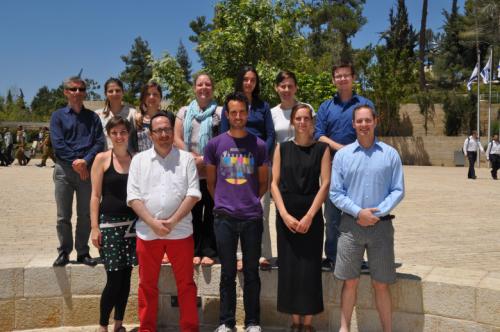The EHRI Summer School at Yad Vashem: A Network for Young Scholars

The third EHRI Summer School in Holocaust Studies took place from 24 April to 15 May 2014 in Jerusalem and was hosted by EHRI partner Yad Vashem. Participant Jan Issinger reports on the event:
The third EHRI-Summer was very special on multiple levels. Apart from The International Institute for Holocaust Research, where the biggest part of the summer school was held, we were guests of other important research facilities like the Yad Ben Zvi Institute and the Ghetto Fighters’ House in northern Israel. A benefit of the EHRI program was that we were able to connect to these archives on a very personal basis – the head of the archives showed us around and encouraged us to explore their sources with the help of their staff-members. The opportunity to work with the records turned out to be very useful for almost all participants, as the archives contain large collections of a broad variety of Holocaust related topics, which were collected all over the world and have a high rate of digitalization.
Leading international researchers
During the three weeks of the seminar we were able to listen to and even more importantly, discuss with leading international researchers, like Mary Fulbrook, Yehuda Bauer and Hanna Yablonka, who introduced their current research results and perspectives to us. An important advantage was the discussion we could individually have with these researchers which was beneficial to our own research projects. It was furthermore useful to understand how these researchers approached their sources, and to discuss with them their methods and theories, consequently, the approaches we are currently using ourselves. But we did not only learn about the work of single researchers, we got to know many current projects carried out by research groups within YadVashem, like the Shoah Database.
A relaxed environment
Apart from the great direct benefit for our own work on different Holocaust related topics the summer school provided something even more important: A network for young scholars from all over Europe who are at the beginning of their careers. It was very good to get to know fellow junior researchers in a setting which was not limited to a single department of a university or a single country. It was inspiring to meet colleagues from all over Europe in a very relaxed environment. Staying together in a nice hotel gave us a constant opportunity to exchange even when the daily lectures were over. This was supported by the social program that framed our time in Israel. We went on guided trips to Masada, the old city of Jerusalem and the Valley of Ein Karem. As part of our extracurricular activities we were also able to attend the Holocaust and Martyrs’ and Heroes’ Remembrance Day, which taught us a lot about the way contemporary Israeli society deals with its past and how the victims of the Holocaust are remembered today.
Heterogenous backgrounds
Even as all participants came from heterogeneous backgrounds we became a group that exchanged ideas and provided each other with help within our own field of expertise. We learned from the different perspectives and historiographies on the Holocaust in each other’s home countries. Also, the Summer School demonstrated how an interdisciplinary cooperation between historians, sociologists and researchers from literature studies can actually work. As this exchange was driven by our own interests and needs it was not superimposed in any way.
A long lasting network
I really got the feeling that the summer school helped to develop a long lasting network of young talented colleagues, which might be part of a framework for a new generation of holocaust scholars. As there are already plans to invite each other to our home institutions and plans for further cooperation in research were brought up, these networks will last long.
Programme EHRI Summer School Jerusalem
Photo: trainees EHRI Summer School Jerusalem. Jan Issinger is in the back row, far right. © Yad Vashem
